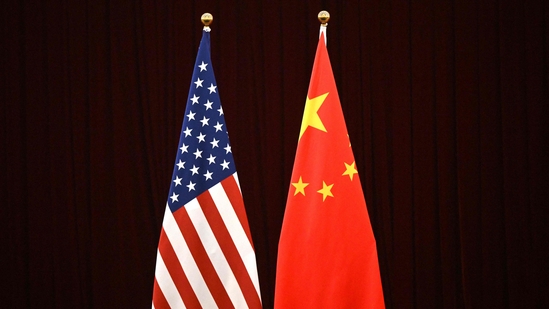Trump’s tariffs are starting to hammer Chinese exporters

If the tariffs remain in place, the WTO expects that Chinese goods exports to America, worth about $440bn last year, will fall by 77% in 2025.
Editor’s note (April 30th): This story has been updated.

To look out on Ningbo-Zhoushan Port, the busiest port in the world by cargo throughput, you would not know there is a trade war going on. Security around Chinese ports is tight, but from a wooded hill overlooking one of its giant terminals, it feels as though it is just another normal working day. Lines of trucks steadily snake into the port, bringing in red, grey and green containers. Forklift operators scoot around, stacking them up in towers. Most of the dozens of towering gantry cranes in the terminal are in operation, loading the containers onto ships. A huge vessel, packed with cargo, sails out of the harbour into the Pacific ocean.
The trade war between America and China has reached an ugly stalemate. Both sides have suggested they are open to de-escalation, but the chances of a formal deal any time soon seem slim (see Finance & economics section). If the tariffs remain in place, the World Trade Organisation expects that Chinese goods exports to America, worth about $440bn last year, will fall by 77% in 2025. On April 30th a gauge of new export orders fell to its lowest level since 2022.
That Ningbo-Zhoushan looks active reflects the fact that China exports to the whole world. America is the country with which it trades the most, but accounted for only about 15% of its exports last year, down from over 20% at the start of President Donald Trump’s first term. Still, few places are more exposed to the trade war than Zhejiang province, where Ningbo is located. It is one of China’s export powerhouses, with some 90,000 companies manufacturing for the overseas market. Its workers and businesses are feeling the effects of Mr Trump’s tariffs.
Lorry drivers catching a cigarette and a snack at a rest-stop near the port reckon that the volume of containers they are moving from Zhejiang factories to the port and back has slipped by up to a third in recent weeks. One grumbles about that “bully” Mr Trump. Cosco, a big Chinese shipping company, says the volume of containers crossing the Pacific fell by 12-13% in the first three weeks of April compared with March, and that the decline will probably accelerate to 20% by the end of the month.
Jack Shi, a factory owner in Ningbo who makes parts for vacuum cleaners, says the firms he supplies are already laying off workers because of the tariffs. He hopes to manage by shutting down some of his industrial robots. Shuangma, a Zhejiang plastics manufacturer, reported that cancelled orders have cost it 150m yuan ($20m) so far. Feilong, a white-goods-maker up the coast, told state media that American orders for 3,000 of its fridges and washing machines have been cancelled. Some 16m jobs in the export sector may be endangered if the trade war continues, says Goldman Sachs, a bank.
China’s government hopes exporters can survive by selling to other countries or tapping the domestic market. Teams from local governments have been sent out to advise companies. After a meeting in April, the Politburo, China’s top-decision-making body, called for help to ease exporters’ efforts to raise funds. Tech companies are pitching in. jd.com, an e-commerce giant, has said it will buy 200bn yuan of export goods and resell them at home.
But much of the rest of the world is already complaining about an excess of cheap Chinese goods, and the home market will also struggle to swallow much more. Consumer sentiment is weak, amid a property slump and high unemployment.
Chinese customers also buy different products. Some 200km inland, in a maze-like building in the wholesale market of the city of Yiwu, a young man named Ding Heng sits in front of a small forest of plastic Christmas trees. His firm usually sells about 1m yuan of them to America every year. All those orders have been put on hold since tariffs were announced, he says. They will have to resume soon or he will miss this year’s season. “There’s still time now. After two months there won’t be.” And there is no market for them in China.
Hats off
Last summer Su Zhan’s hat-making company received a rush of orders for bright red baseball caps emblazoned with “Make America Great Again”. Mr Su shipped lots of the caps to America, and would be happy to send more. But few people are buying them these days. Mr Trump’s tariffs have made them too expensive for American importers. Half the firm’s orders have been cancelled.
Surprisingly, some Yiwu traders say they sympathise with Mr Trump’s aims. “I think they’ve no better option. America’s manufacturing industry is gone and they’re trying to bring it back,” says one trader. “Without manufacturing a country’s power will wane.” Others grumble about American attempts to stop China’s rise. Few, however, think Mr Trump’s tariff strategy will ever really threaten the dominance of China’s factories. America’s labour costs are too high, and “American workers like freedom, they can’t deal with tedious work,” says one trader sagely.
As a result, many exporters think Mr Trump will back down on his tariffs, as American consumers start to suffer from the lack of their products. The traders are encouraged by the back-and-forth with other countries that resulted in a 90-day pause. Still, things will be tough in the interim. Mr Su, for his part, still has to sell his baseball caps. Perhaps shipping them to Mexico and scraping off the “Made in China” label might work, he suggests.
All Access.
One Subscription.
Get 360° coverage—from daily headlines
to 100 year archives.



HT App & Website







